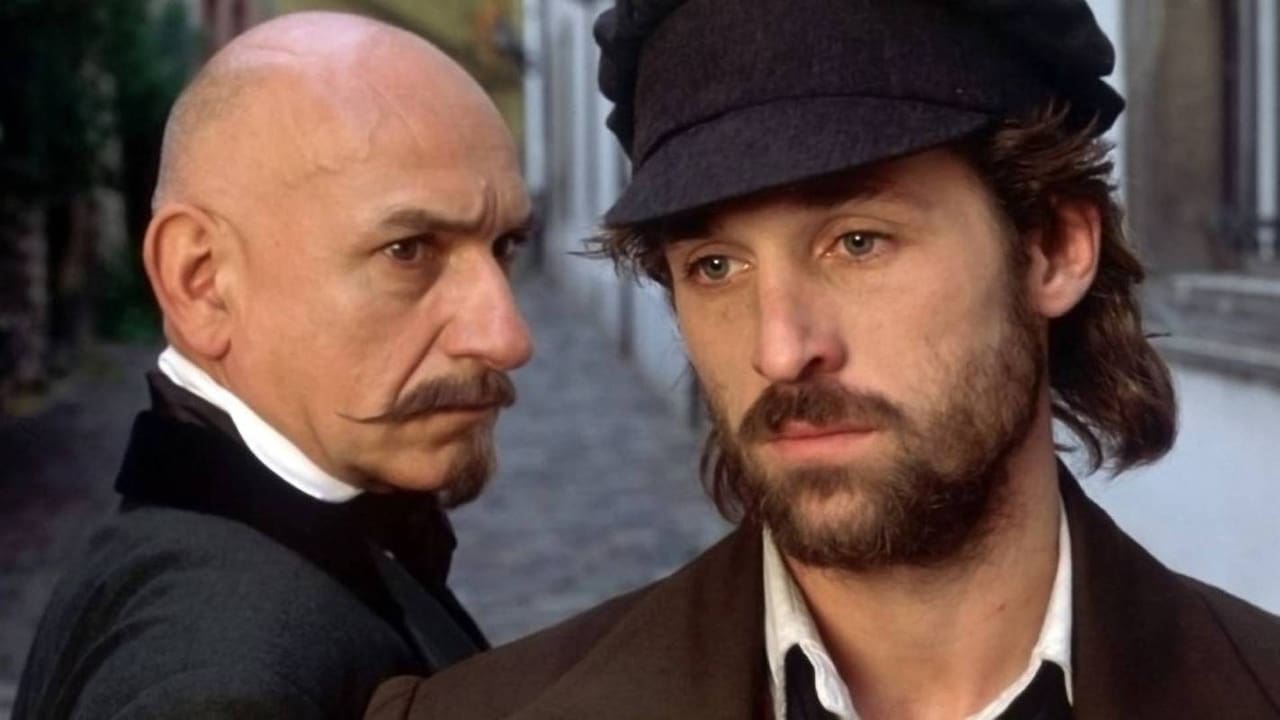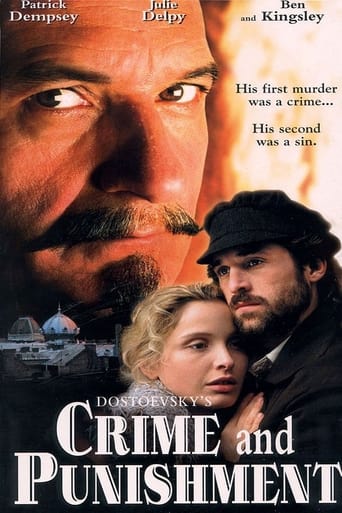



The greatest movie ever made..!
Clever and entertaining enough to recommend even to members of the 1%
View MoreI didn’t really have many expectations going into the movie (good or bad), but I actually really enjoyed it. I really liked the characters and the banter between them.
View MoreStory: It's very simple but honestly that is fine.
This isn't bad. As far as that goes, it must be hard to botch the story, but this version does have its weaknesses. On the DVD I watched, the sound was poor, for one thing. It's not a minor flaw either, because the characters speak with Russian accents, and some of them are a little difficult to decipher to begin with. The recording lends the film a kind of cheesy feel.And some illuminating instances from the novel, if I remember it accurately after many years, are dropped. A villain slipping a coin into a young woman's dress to make her seem a thief, for instance. I understand that all adaptations have to shorten the original material but, as usual, what gets dropped is the subtle stuff that makes the characters more than categorical types. And not just that. When the drunken old neighbor dies in an accident, the poverty is such that his wife doesn't have enough money to bury him, so she packs up the children, dresses them in rags, and they dance on the street as clowns, hoping for a few coins. They don't make it, and the body in the bed begins to decompose. Man, that's tragedy not just hard times.Patrick Dempsey is all hairy and sweaty as Roskolnikov. He's projects the guilt alright but lacks the bravado that ought to mask it. Julia Delpy as Sonia the whore does a fine job. As Dunya, the sister, Lili Horvath is pretty but a cipher. Her expression never seems to change, her features frozen.Outstanding is Ben Kingsley as Porfiri, the police inspector who intuits Raskolnikov's guilt and plays on it with good-natured hospitality and reassurances that he, Raskolnikov, is not a suspect. Until finally Porfiri reveals that he knows who did it. In the translation I read, I remember that exchange. Porfiri and Raskolnikov have been discussing the murder for some time and, piqued, Raskolnikov asks who committed the crime. Porfiri looks up in surprise and says with some wonderment, "Why, YOU did, Raskolnikov." In this movie, the conversation is different and Kingsley gets to toss the accusation off with a reference to "the murderer, who is, of course, you." There is a close up of Kingsley's face when he makes this statement but there have been so many close ups previously that some of the power is drained from the shot. Still, that game of cat and mouse between the murderer and the inspector is a delight, especially among so much gloom.You know who handled the role of Porfiri as well as anyone else -- in any version of this chestnut? Okay. Hold on, because I'm about to reveal my perversions. Well, one of them anyway. Frank Silvera, in "Crime and Punishment, USA," that's who. And, believe it or not, George Hamilton was a perfectly reasonable Raskolnikov too. I'd better stop sharing my perversions now or before I know it I'll be into my collection of fancy goldfish bowls.Everybody tries hard here. Earnestness is written all over this production. And it isn't terrible. I just wish it had been better, because it's almost like looking into a time capsule -- all the way back to when criminals still had guilt.
View MoreCrime & Punishment Dostoyevsky 1998 film (Dir. Joseph Sargent)The film focus is on Rodya, a young atheist student who mixes social idealism (a theological given) with delusions of grandeur. He perceives that morality is an absolute, yet entertains the idea that it is purely social and that he himself is above the moral law "like Napoleon". At one stage he risks his life to save two unknown children; late he murders two known women (intentionally, evil Alena, & unintentionally, her good sister, Elizaveta) in his anger against injustice & desperation to get Alena's ill-gotten gold to save his sister (Dounia) from an economic marriage he fears.To a large extent the story follows the aftermath of his murders. It never successfully comes to a point where he repents of murdering the old parasitical crone Alena, although her dying has haunted him. He slides into paranoia and away from his former idealism, though still acts as benefactor to the Marmeladov family. His self-belief (supermen don't get caught) has been shaken, and the police chief (Porfiry) investigating the sisters' murders perturbs him. (I felt it unclear whether Porfiry wishes Rodya an unalloyed "get it off your chest" wellness, or also has a greedy eye for stolen gold. Indeed I felt a number of loose ends were left. This encourages one to read the book!)Spiritually drowning, "a monster", Rodya asks Sonia Marmeladova to help him resurface through a Lazarus' experience (cf. John ch.11). She, earlier forced into prostitution to feed her family, has had a Bible given by Elizaveta, and believes that God alone, or at least Faith alone, can save Rodya, whom she is deeply gratefully to, and probably would marry for love. She says that repentance leading to confession of his crime, inviting civil punishment, is the key to saving his soul. If he will dare this road, she will walk with him "to the ends of the earth" they end up in a Siberian prison camp, he a prisoner, she a nurse.In the camp a chaplain raises the cry, "Christ is risen". Russian Orthodoxy was a key element in Russian society, yet it is probably true to say that Rodya's salvation is merely of the soul (psyche), not quite of the spirit. Still a movement in the right direction. Human loves can reflect (the Sonia factor), and thus point to, transcendent love, though in themselves become demonic as the murders show (the Alena factor).Issues such as class divides, the problem of pain within theism, and morality as transcendent vs mere convenience, are hinted at but not fully explored. The acting is good, though a message rather than story is the focus. There are interesting subplots & characters: Dounia's former co-employer (Arkady) is besotted by her simple beauty, and while prepared to betray his wife is not prepared to rape, ending his own life in his despair in failing to win her love which he imagined would give his life meaning Dounia lovingly marries Dimitri (aka 'Reason'), her brother's best friend and a nephew to Porfiry.
View MoreA quiet cinemaization of a masterpiece. Nothing special, strange or beautiful. An ordinary acting and good work. It is a vain ambition to desire translate the Dostoievski's world in a movie. Important is the respect for novel's spirit. And the film is a interesting example for this rule.Ben Kingsley is correct in the skin of a proteic character. Patrik Dempsy is a special Raskolnikof, victim of desire to show every aspect of a silent crisis. But what instrument is perfect for the Russian soul examination? "Crime and punishment" is not a great TV movie. It is not a reject or a boring piece of weekend afternoon. Corect, without any ambition, it is fairy description of a impressive literary creation. But is it enough? Maybe for the public who ignore the book because the movie is, in fact, only a noble intention.
View MoreAfter many stupid movies I had to watch this one was refreshment. Although there are disproportions between movie and novel in many ways, I think it is very worth watching and recommend it to everyone. After this movie you should read a book, and not just Crime and punishment but others Dostoyevsky books too. I was so stupid I was ignorant and haven't read Dostoyevsky's books so far but will try to change this in future. Also, I must notice that at the end movie is too pathetic, it seems that director haven't fully understood its final words but anyways it is one of better movies I watched in last years and worth remembering. Thanks and regards.
View More